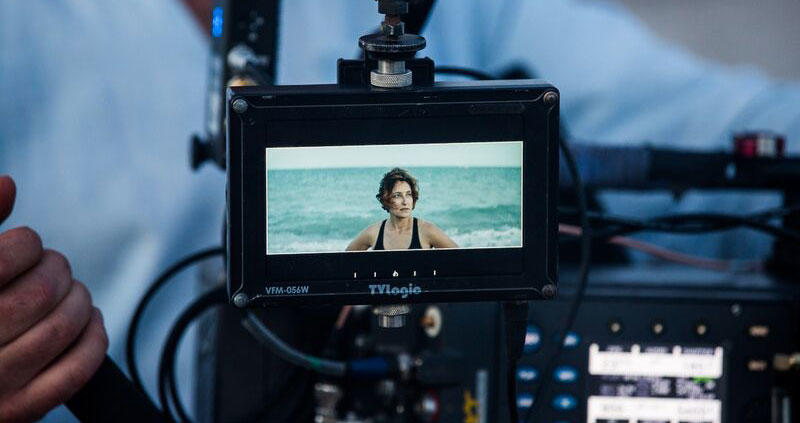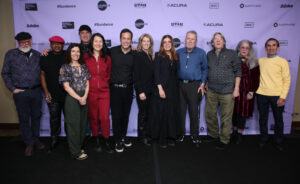Jordana Mollick. Photo by Erik Anders Lang.
Sundance Institute
The role—or perhaps we should say the perception—of the creative film producer is one often muddled by notions of financial brokering and budget consciousness. It may be the film credit most often dislodged from its raison d’etre, which is inherently creative. There’s a reason that producing teams appear on-stage to accept Best Picture honors during award seasons, and it has everything to do with their intimacy with a project from conception to completion.
Sundance Institute’s Creative Producing Lab & Fellowship is dedicated to nurturing the next generation of independent producers, while renewing the community of veteran producers dedicated to sustaining the vibrancy and vitality of independent film. As we enter the 10th year of the Producing Lab, we’ve checked in with five recent alumni of the Creative Producing Program who provide a window into their creative worlds and offer up some tips for aspiring filmmakers.
Sophia Lin, Class of 2008

What project(s) are you currently working on?
At the moment, I’m winding up to start production on a project that’s been in the works for a long time, a horror film called The Beach House (writer/director: Jeff Brown).
What has challenged or surprised you in your experience releasing or making Z for Zachariah?
Z for Zachariah was an extraordinary experience for many reasons. Making the leap to a more substantial budget with director Craig Zobel after collaborating on multiple projects, working with name actors, and shooting in New Zealand, was all unforgettable. But there was a substantial part of making the film that was really tough, and that has affected my approach to new projects and partners.
What was very challenging and, frankly, totally surprising was the degree to which the financiers and distributor fought against the film itself. The script was unusual and thoughtful, and with Craig at its helm, attracted three incredible performers—Chiwetel Ejiofor, Chris Pine, and Margot Robbie. But once we were in post-production, it became clear the financiers and distributor had been hoping for a tawdry thriller rather than the beautifully nuanced film Craig made.
It was particularly baffling because we had spent a couple of years trying to get a green light, during which time the script was hardly a secret. Yet somehow they were surprised and displeased by the finished product. I don’t know if it it was that disappointment or their individual personalities, but they really fought the film hard, including not wanting to accept a premiere slot at Sundance. Perhaps it was my own fault for being naïve, since it’s an experience many other filmmakers have had to the point of cliché, but that was definitely not something I expected.
Can you recall a specific moment from the Creative Producing Lab & Fellowship that you’ve carried into your current philosophy on producing?
One specific thing that I took away from the wonderful, experienced advisors at the Lab was that a film can only be as good as its scrip—and therefore, if you were going to spend potentially years of your life getting a film made, it would be best for you and everyone if the script was great. Otherwise, you’d run the risk of devoting valuable resources to making something not equal the money, time or effort put in.
Why is it valuable and important to you that you give back to up-and-coming producers?
I’ve been lucky enough to receive support and encouragement throughout my career. Craig Zobel suggested I apply to the Creative Producing Lab, and Lisa Muskat wrote me a recommendation when I didn’t think of myself as having the potential for the program. David Gordon Green introduced me to Jeff Nichols, who asked for my help on Take Shelter, and in doing so, gave me endless opportunities. The producers I worked for in production for many years, Derrick Tseng and Jonathan Shoemaker, never hesitated to bring me along on every job and promoted me ceaselessly along the way. It’s impossible to pay all this back, so I try my best to pay it forward.
What is the most common misperception about the role of a film producer?
I think sometimes people think that producers can just magically conjure financing out of thin air. It’s an incredible amount of work and requires many preconditions; even if the script is great and the director talented and the cast appealing, it’s still far from easy.
What’s one piece of advice you would give to a young producer?
I think it’s okay to protect yourself. By that I mean, choose the project and people you’re working with carefully. If your views clash, ask, do you really want to work with this person? And, it’s okay to value your time, energy and reputation—not everyone will, so you should.
Dan Janvey, Class of 2009

What project(s) are you currently working on?
We’re in post on two films. One is called Patti Cake$, which is written and directed by Geremy Jasper and is a love letter to hip-hop and three generations of Jersey women. Geremy wrote all of the music in the film, and it’s full of heart. It’s about to premiere at Sundance. The second is Brimstone & Glory, directed by Viktor Jakovlevski, a completely wild and immersive documentary about a fireworks festival in Tultepec, Mexico, which recently suffered a disaster when a local fireworks market exploded. Luckily our cast, crew and friends are all fine, but it is a painful reminder of the dangers facing the community there.
What has challenged or surprised you in your experience releasing/finishing your most recent project?
I have a fond memory of finishing Heart of a Dog with Laurie Anderson. Working with Laurie was a joyful experience. It was also unusual. Laurie has her own process of making things—it is organic, open, and ever shape-shifting. Instead of going through a typical film post sound process, Laurie sought to replicate her process making records.
This included working and designing the various sound elements (design, voice over, score, effects, etc.) in a typical way, but instead of using the various stems and going into the mix with them as distinct pieces, Laurie mastered her movie as if it were a record. I remember spending a lot of time trying to figure out the difference between a final mix of a movie and mastering a piece of music, and became quite confused.
In the end they are both creative, alchemic solutions to elevating the work into its final form—it’s just that Laurie’s process of mastering did not involve treating the individual elements separately. The sound and feel of the movie as a whole is how Laurie wanted to approach the finishing process.
And then Italian distribution came up. As is the custom there, all movies are dubbed into Italian. This is usually created off of an M&E version of the film, where the dialogue track is removed leaving only music and effects to be filled in by the new dialogue performances. The idea of breaking up the movie, and removing the VO was not something Laurie felt comfortable with.
The producer in me was a bit panicked. We had signed the contract, and there was no wiggle room on the delivery. But instead of relenting or becoming despondent Laurie’s solution was to literally remake the movie herself in Italian! This meant working with a translator, and practically teaching herself the language, which she only had a basic grasp of to begin with.
Can you recall a specific moment from the Creative Producing Lab & Fellowship that you’ve carried into your current philosophy on producing?
It’s amazing how often Josh Penn and I bring up the producing labs in our day-to-day work together. We did the program back in 2009, as we were trying to put together Beasts of the Southern Wild, the film we workshopped there. I’m not sure Josh and I knew anything about anything prior to the lab. We had just done a few shorts and music videos, and were completely green.
The biggest concrete element Josh and I have incorporated into our producing work is a process of identifying the essential elements of any given film. These ideas come to life during development, and it is a process of honing in on what really matters to any given project. The actual essential elements end up being incredibly simple, but they become guideposts for when you have to make tough decisions. This is especially relevant in instances where resources are limited, and it helps you as a producer protect the overall integrity of the material and process of the director.
Why is it valuable and important to you that you give back to up-and-coming producers?
I find working with up-and-coming producers inspiring and exhilarating. They teach you new things, push back against conventional wisdom, and make you realize what aspects of yourself are full of nonsense. Everyone brings a unique life experience to producing, and up-and-coming producers aren’t jaded, and they also do not necessarily know why something may be impossible, which is the only way to actually accomplish something impossible.
What is the most common misconception about the role of a film producer?
I’m still not sure how to answer the question “What do you really do?”
What’s one piece of advice you would give to a young producer?
It’s okay to work with your best friends.
Adele Romanski, Class of 2010

What project(s) are you currently working on?
I’m currently in production on David Robert Mitchell’s Under the Silver Lake. I’m also in pre-production for Amy Seimetz’s second season of Starz’s The Girlfriend Experience. Scheming some other things as well—including re-teaming with Barry Jenkins and Plan B on an adaption of Colson Whitehead’s National Book Award Winner The Underground Railroad.
What has challenged or surprised you in your experience releasing Moonlight?
I always believed that Moonlight—once on screen—would find strong critical support and would resonate deeply both with those who saw themselves in Chiron and those who didn’t easily and readily identify with our protagonist. What has been both surprising and overwhelming is the unanimous consent among critics which has led to the film joining this year’s award conversations (Moonlight recently won the Golden Globe for Best Picture).
Moonlight was not designed to compete in the awards race we find ourselves in. We made the film with the same passion, sweat and tears with which we approach (and which I believe all filmmakers) approach each project. And while that passion has translated before into films I’m deeply proud of, films that have gone on to find a festival premiere, a buyer, an audience—that passion has never landed us in this exact spot before.
Moonlight was also unique (for me) in that we knew before we shot the first frame that the film would be released by A24, who we had (and still have) the utmost faith in as distributors. (They came on board at the financing stage.) Unconsciously, I think this allowed us to focus on making the best film that we could with little energy or anxiety going to where the film would end up. And in the absence of that pressure and on the basis of prior experience, the possibility of awards was simply not contemplated. But in the words of Kevin (played by Andre Holland), “We here.”
It continues to be a fascinating and absolutely humbling ride—one that began with love for the script, its characters, its filmmaker, and the team. Much in the same way that we were allowed to stay focused on the film while making it, and allowed to stay in the moment and avert our gaze from the future, I’m doing my best in these times to sit with each moment and to cherish the experience in the same way we cherished the experience of making the film.
Can you recall a specific moment from the Creative Producing Lab & Fellowship that you’ve carried into your current philosophy on producing?
I remember one of our lab advisors telling us that she made it a point to call her director(s) every day. I thought that was really sharp. Especially in the development phase, which can last for years, during which you’re most likely working out of different physical spaces. It’s important to connect, to communicate so that you and the director remember you are both present, every day, working together to propel the project forward.
Why is it important to you that you give back to up-and-coming producers?
Scott Macaulay. Scott Macaulay. Scott Macaulay. Back in 2006, when I was trying to get The Myth of the American Sleepover off the ground I started bugging Scott (What’s a budget supposed to look like? What are deliverables?), and he always responded. I had no right to ask of his time. I was an editor back then, and barely one at that. I was just an aspiring kid producer with an impossibly ambitious script and no real idea how to get it made.
And yet, Scott was so open and generous with his time. I’m still thanking him for this generosity each time our paths cross. We don’t get where we’re going without a little help from the ones who’ve gone before. Ten years down the road from where I started, I owe it to Scott and the countless others along the way to give back to those just beginning to forge their own trail.
What is the most common misconception about the role of a film producer?
Each time I start a film with a new crew I feel like I have to reprove my bona fides. By which I mean, for every one or two film sets I’m on in a given year, the crew is on three or four times as many and over the years have had enough bad producer run-ins that a stereotype has emerged—a stereotype I then spend the first two weeks of every production working to break down and counteract.
I attempt to do this by reinforcing that I am an honest person. I have integrity. Yes, I care about delivering the movie on the budget I said it would be done and no, I don’t love incurring overtime—but I don’t want you to work for free. I care about doing things the right way over saving a buck. I care about your safety and well-being. I want you to enjoy being here. I want to build a set culture where you can share in the excitement and pride that I feel for what we are doing and hopefully have some fun doing it.
What’s one piece of advice you would give to a young producer?
Commission an actual budget—or build it yourself. Don’t ballpark a number for what you think your net spend will be without building a budget first! It’s always so much higher than you think it will be. And if you decide to do it for less, at least you do so armed with the knowledge of what you’ll be giving up in order to do so.
Lucas Joaquin, Class of 2012

What project(s) are you currently working on?
I’m starting a new production company with producers Alex Scharfman and Drew Houpt called Secret Engine. We have several features and series in development with the next ones to shoot being The Stay, written and directed by Stewart Thorndike, and Blow the Man Down, written and directed by Bridget Savage Cole and Danielle Krudy. I’m also in post-production on a feature called Love After Love, written and directed by Russell Harbaugh and starring Andie MacDowell and Chris O’Dowd.
What has challenged or surprised you in your experience releasing or making Little Men?
I was pleasantly surprised by the critical response for Little Men. On its face the film is about a fairly ordinary conflict: a dispute between a landlord and a tenant. But beneath the surface, that conflict begins to reveal a profound drama about class difference, how it affects our friendships, and how we inherit our parents’ flaws and shortcomings. Fortunately, critics around the world understood it and championed it, which was key to its success.
What wasn’t surprising to me, however, was the continued challenge, even with such critical support, to get a film out to audiences. With so many films and television shows on so many different formats vying for viewers’ attention, it continues to be difficult, especially with such a subtle film, to reach a wide audience.
Can you recall a specific moment from the Creative Producing Lab & Fellowship that you’ve carried into your current philosophy on producing?
The piece of advice I find myself returning to is a simple but reliable one from Lynette Howell, which is to aim to “set the table” at a project’s inception, and throughout the process of producing a film. In the process of producing a film, one can easily become concerned only with the tasks immediately in front of one’s face. It’s important, at the outset, when one can do so with a relatively clear mind, to create a structure that can be filled throughout the process. Of course, that structure will always need re-calibration through the making of a film, but hopefully it’s built in such a way that it can withstand all of those adjustments to come.
Why is it important to you that you give back to up-and-coming producers?
We work in an industry that is, like most, shaped by market forces. These forces are constantly pushing us in the direction of higher profits. If we only obeyed those forces from outside telling us what is valuable, the films we produce would never be made. It takes commitment, creativity, and often thankless work to continue ahead and support stories that contain some truth about our shared humanity—to create or find value where the market says that none exists. The only way to ensure that this work can continue, is to impart whatever knowledge we’ve gleaned to our peers, and to those producers at the beginning of their careers.
What is the most common misconception about the role of a film producer?
The most common misconception about film producers is that we deal solely with financial concerns. While we need to be financially responsible, the most important part of that is working with our creative team to make the best possible version of a film. Most of our work requires creative thinking—the most gratifying part of our jobs.
What’s one piece of advice you would give to a young producer?
Film is a collaborative art. Surround yourself with the best people you can find, and then trust them to do the work they’ve agreed to do. We are fortunate to have a wonderful community of artists, craftsmen and women, crew, and financiers around us who want nothing more than to create great films. Embrace that, enjoy it, and push everyone, including yourself, to do the best work possible. More than anything else, trust the members of your team and that trust will be returned to you.
Jordana Mollick, Class of 2012

What project(s) are you currently working on?
I’m finishing production on a half-hour digital series for Verizon and also in post on another that will be released on January 18. I also just completed a series for Warner Brothers and am in the process of adapting a short film I produced into a feature starring Laura Dern.
What has challenged or surprised you in your experience releasing Hello, My Name Is Doris?
Every step in the process of the release strategy for Hello, My Name Is Doris has been a learning experience and therefore, a challenge and a surprise. As a producer, you’re used to doing everything for your film from beginning to end, and being the one in control. When you sell your movie to a distributor, they now have most of the control and you need to trust and hope that they will do what’s best for your baby. I was lucky to have a great distributor in Roadside. Doris had come out of its premiere at SXSW with very good reviews and awards buzz for Sally Field.
When Roadside bought the movie, we found out that they didn’t want to release it until the following year, right after the Oscars, which basically would take her out of consideration. We were gutted and shocked, and I was anxious about delivering this news to her, but Roadside had a plan. They said that comedies, especially tiny independent ones, often get lost in the crowded fall of the awards pushers, and that it was more important for this movie to be a success. In order for that to happen, we should release in early spring. And they were right. Our barely-over-a-million-dollar indie comedy went on to make almost $15 million in the domestic box office.
Can you recall a specific moment from the Creative Producing Lab & Fellowship that you’ve carried into your current philosophy on producing?
I went into the Creative Producing Lab feeling incredibly insecure about my lack of physical production experience. I had come from being a development executive and a theater producer and was also a literary manager (and still am). I looked around me at my talented lab fellows, many of whom had come from being line producers or had other relevant set experience, and I wasn’t sure where to begin or how to “produce.”
I quickly learned from the lab that we all have different tools and different experiences and we need to empower ourselves to use them to start the process. While one person might be a whiz with a budget or speak the language of the camera department, I knew how to speak to agents and financiers and how to attach cast to my projects. In the end, you learn what you don’t know by going through the process, but start with your toolbox because it is unique to you.
Why is it important to you that you give back to up-and-coming producers?
Part of the reason that I give back to up-and-coming producers is purely selfish. I like watching movies and I depend on creative producers to make them. I’m not the person to tell every story and it’s exciting for me to meet other passionate hard workers and hear about the stories that they want to tell. I also would not have the knowledge or energy to push these boulders we call “projects” up the mountain if I didn’t have mentors and peers holding me up and showing me the path. We producers have to support a lot of people and we shouldn’t feel alone in that journey.
What is the most common misconception about the role of a film producer?
Most people have no clue what a film producer does. They often think we just write the check, when in fact, that usually has nothing to do with our job. I also think most people don’t realize that being a film producer is a creative job.
What’s one piece of advice you would give to a young producer?
Keep pushing the boulder up the mountain and collect as many skilled collaborators as you can along the way to push with you. If you believe deeply in the project and can get others to believe with you, the process will be as rewarding as the success.




